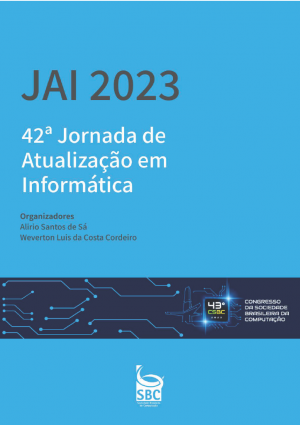Learning Journey on Informatics 2023
Keywords:
JAI 2023Synopsis
Learning Journeys on Informatics (JAI) has become a reference in presenting relevant topics for research and development within the Brazilian Computing Society Congress (CSBC). JAI has contributed significantly to the dissemination of cutting-edge knowledge in computer science to students, professionals, and researchers in Brazil.
In its 42nd edition (JAI 2023), the topics of disinformation on digital platforms, reliability and security on distributed computer systems, sustainability of research software, in-memory databases, and softwarization of cellular networks are addressed.
Chapter 1 (Disinformation on Digital Platforms: Concepts, Technological Approaches, and Challenges) discusses the current scenario of studies in the context of disinformation on digital platforms, offering an introduction to the researcher who intends to explore this topic. To achieve this, initially, the authors (1) present and discuss basic concepts, (2) list data repositories helpful in studying this phenomenon, (3) summarize the main strategies explored for understanding, as well as technological approaches to detection and monitoring of disinformation on digital platforms and (4) present a critical overview of the area, highlighting challenges and research opportunities in this context.
Chapter 2 (Reliability and Security in Distributed Physical-Digital Systems) focuses on studying distributed cyber-physical systems – characterized by physical components that are geographically dispersed and interconnected through communication networks, thus creating a decentralized and collaborative infrastructure. The authors discuss the physical-digital relationship challenges in these systems, including interoperability, reliability, cybersecurity, and scalability, and discuss how autonomic management has been used in these systems. The chapter presents a theoretical-practical approach for building autonomous or autonomic distributed systems that can fulfill the performance, reliability, and security requirements of the distributed physical-digital systems.
Chapter 3 (Principles and Practices for Sustainability of Research Software) focuses on Research Software, that is, software developed in the context of scientific research, highlighting the concern in the scientific community with its sustainability and influence on the ability to reproduce scientific studies by independent researchers. The course addresses the sustainability of Research Software from a technical perspective, in which the authors present and discuss good software development practices that can be useful to support researchers from different areas in the development of sustainable research software. Throughout the course, the authors present motivations and examples of the use of practices, their benefits, and related challenges through the results of a study conducted with a research group in the field of Physics.
Chapter 4 (In-Memory Databases and their Failure Recovery Strategies) discusses the potential and challenges of using in-memory database systems, which present themselves as an alternative to systems that need massive and real-time data processing. The authors present an overview of the architecture and implementation of in-memory databases and their main failure recovery strategies. To achieve this goal, the course (1) provides an overview of in-memory database technology, (2) reviews crash-recovery concepts, (3) presents key architectural choices for implementing in-memory databases, and (4) describes recovery strategies implemented by a representative sample of modern in-memory databases.
Chapter 5 (Disaggregating and Softwarizing Cellular Networks and the OpenRAN Brazil Program) aims to present the concept and challenges that are leading academia and industry to invest in the concept of the open RAN. The authors introduce the historical factors of the evolution of the RANs, concepts of openness and softwarization, and address disaggregation, RAN intelligent controller (RIC), Core Networks, virtualization, open interfaces, and challenges. The course also discusses the worldwide initiatives that are collaborating in the advancement, standardization, and development of OpenRAN, a framework with standards, protocols, and open-source software. The authors detail the OpenRAN Brazil Program, presenting its motivation, objectives, expected results, testbed, and applications.
Chapters
-
1. Disinformation on Digital Platforms: Concepts, Technological Approaches, and Challenges
-
2. Reliability and Security in Distributed Physical-Digital Systems
-
3. Principles and Practices for Sustainability of Research Software
-
4. In-Memory Databases and their Failure Recovery Strategies
-
5. Disaggregating and Softwarizing Cellular Networks and the OpenRAN Brazil Program
Downloads

Downloads
Publication date
Series
License

This work is licensed under a Creative Commons Attribution-NonCommercial 4.0 International License.


